ENA - ENA English
Headlines
PM Abiy Inaugurates Shabeely Resort
Jan 31, 2026 129
Addis Ababa, January 31, 2026 (ENA) — Prime Minister Abiy Ahmed today officially inaugurated the Shabeely Resort in the Somali region, a landmark 385-hectare development realized under the Dine for Generations initiative. This flagship project signifies a major leap in the national effort to harness Ethiopia’s diverse natural and cultural wealth for sustainable tourism growth. Reflecting on the achievement, office of the Prime Minister shared: "The Shabeely project, which is part of the Dine Initiative in the Somali region, with three restaurants serving up to 400 guests, a dedicated cultural venue, high-tech meeting halls, children’s play areas, and shaded walkways across its 15.4 km expanse, Shabeely is designed to foster connection and community.’’ According to the post: ‘‘From the 10,000-tree Fruit Park to the authentic Camel Park, every feature celebrates Ethiopia’s natural and cultural wealth. With 51 completed keys and world-class hospitality facilities, Shabeely marks a milestone in Ethiopia’s journey to become one of Africa’s top tourist destinations.’’ PMO further elaborated that this project embodies the Medemer spirit—turning Ethiopia’s dreams into reality by transforming our abundant natural and cultural endowments into a shared heritage for the world."
Italy, Companies Ready to Support Ethiopia's Strong Economic Growth, Reform Path: Ambassador Fabrizi
Jan 31, 2026 199
Addis Ababa, January 31, 2026 (ENA) - “Ethiopia is embarking on a strong economic growth and reform path, and Italy and Italian companies are ready to support this trajectory,” Italy’s Ambassador to Ethiopia, Sem Fabrizi, told ENA. In an exclusive interview, the Ambassdar emphasized the Italian government’s strong focus on Ethiopia, and underscored the Mattei Plan as a forward-looking platform to enhance cooperation between the two nations. Ambassador Fabrizi, who noted that Ethiopia is entering an important phase of reform and development, stated that Italy and Italian companies stand ready to support this trajectory, including through participation in major national development projects such as the Grand Ethiopian Renaissance Dam (GERD) and the recently launched Bishoftu New International Airport project. He also highlighted Italy’s role in supporting Ethiopia within the European Union and in global forums. “Italy can leverage its friendship and partnership with Ethiopia in Europe, but also in other global forums such as the United Nations,” the Ambassador said, emphasizing the importance of coordinated engagement on regional and international issues. Areas of cooperation between Italy and Ethiopia cover education, skills development, scientific research, and cultural exchange as key priorities, alongside efforts to contribute to a stable, prosperous, and peaceful region, it was learned. Ambassador Fabrizi said that Italy aims to remain a reliable and close partner, sharing expertise and friendship to support Ethiopia’s long-term development, describing Ethiopia as a country with a long history and a young, dynamic population. He finally stressed the growing importance of diplomacy in an increasingly complex global environment, calling for dialogue and engagement as essential tools for peace and stability.
UNIDO Describes Ethiopia’s Industrial Transformation Model Developing Nations
Jan 30, 2026 642
Addis Ababa, January 30, 2026 (ENA) - The United Nations Industrial Development Organization (UNIDO) emphasized that Ethiopia’s ongoing industrial transformation, driven by sustained investment in energy, value addition and agro-industrial parks, is increasingly being recognized as a model for developing countries. In an exclusive interview to ENA, UNIDO Representative to Ethiopia Stephen Bainous Kargbo affirmed that the country’s experience shows how a clear and strategic industrial policy can accelerate broad based development and attract international attention. He underlined that energy has been the backbone of Ethiopia’s industrial progress, noting that industrialization cannot advance without reliable and expanded power supply. “Ethiopia’s focus on developing access to energy and having more installed energy capacity is very key to industrialization and therefore all forms of development,” Kargbo said. According to him, Ethiopia’s industrial drive is positioning the country as a major force in Africa’s industrial growth, with visible results in job creation, sustainability and shared prosperity. He further stressed that energy supports every sector of the economy and society. “Energy is for every aspect of life,” he said, adding that health, education and social services all depend on adequate energy supply. Kargbo also highlighted the performance of agro-industrial parks developed with UNIDO support, describing them as concrete evidence of Ethiopia’s industrial momentum. “Huge investments have been attracted to these industrial parks and large numbers of jobs have been created and more companies are showing interest,” he stated. He further noted that Ethiopia’s strong emphasis on value addition follows a proven development path taken by industrialized nations. “Building industries is something every developed country has taken as a step,” he said. Calling for inclusive and sustainable growth, the UNIDO representative emphasized the wide economic impact of industrial investment. “One dollar investment in industry or in manufacturing is able to generate multiplier effects in all other aspects, including the Sustainable Development Goals (SDGs),” he said. He added that industry has the potential to drive prosperity by creating jobs and income while protecting the environment and ensuring that growth benefits all segments of society. Ethiopia’s progress is also attracting growing international interest, with several countries visiting the country to learn from its experience in developing industrial parks. “Many other countries have come to Ethiopia… this is already for me an indication that more and more Ethiopia is going to serve as an example,” Kargbo said. He also reaffirmed UNIDO’s continued commitment to supporting Ethiopia through technology transfer, partnerships and industrial networks. “This is the route to development,” Kargbo said, adding, “I see that the future is bright.”
Diaspora Engagement Strengthens Ethiopia’s National Dialogue Process, EDS Says
Jan 30, 2026 569
Addis Ababa, January 30, 2026 (ENA) - The Ethiopian Diaspora Service (EDS) says Ethiopians living abroad are playing a decisive role in advancing the country’s National Dialogue through active participation in agenda setting and consultation forums. EDS noted that Ethiopians overseas and citizens of Ethiopian origin have made meaningful contributions by engaging in discussions on national issues and submitting proposals that reflect shared concerns and aspirations. The National Dialogue process is currently underway across regions and city administrations, as well as among Ethiopians living abroad, as part of preparations for the main national consultation conference. Agenda setting and participatory forums involving the diaspora have been successfully conducted in South Africa, North America, Canada, the United Arab Emirates, Sweden, and the United Kingdom. During these forums, participants deliberated on key national issues, forwarded their agendas to the National Dialogue Commission, and elected representatives to the next phase of the process. Ambassador Fitsum Arega, Director General of the Ethiopian Diaspora Service, told ENA that Ethiopians living abroad have been actively contributing to national development and playing a constructive role in the consultation process. He said the forums helped identify priority agendas and select representatives who will take part in the main national consultation conference, adding that the outcomes of the discussions have been formally submitted to the commission. Deputy Chairperson of the Ethiopian Community in Birmingham, United Kingdom, Helen Befekadu, said the national consultation comes at a historic moment and provides Ethiopians with a vital opportunity to shape the future of their country. “The national dialogue is a crucial opportunity at a historic moment,” she said, noting that many countries have resolved political differences through inclusive consultations and gone on to build strong states that accelerated development. She emphasized the importance of strengthening national consensus through dialogue, stressing that unity within diversity is essential for building a sustainable state. According to her, the agenda setting and participatory forum held in the United Kingdom generated valuable ideas that can contribute positively to Ethiopia’s future. Ethiopians in the UK actively submitted proposals aimed at strengthening state building efforts and resolving differences through peaceful dialogue. “The national consultation is an important opportunity for Ethiopians to resolve their differences through a civilized consultation forum and repeat the Second Victory of Adwa,” she underscored. The Ethiopian National Dialogue Commission has now entered the agenda setting and resource gathering phase, paving the way for the main national consultation conference through continued engagement with stakeholders in regions and city administrations.
Politics
Barbadian PM Hails GERD as Model for Ending Africa’s Energy Poverty
Jan 30, 2026 1000
Addis Ababa, January 30, 2026 (ENA) -Barbadian Prime Minister Mia Amor Mottley has hailed Ethiopian Grand Ethiopian Renaissance Dam (GERD) as a powerful symbol of African self-determination, declaring it a living proof that the continent can defeat energy poverty even when locked out of international financing. Speaking in a widely watched interview with a globally renowned South African comedian, writer, producer, and television host, Trevor Noah, Mottley said Africa’s most urgent development crisis remains access to electricity, an issue often ignored amid global debates about artificial intelligence and advanced technology. “When the world is talking about technology, 600 million people out of 1.4 billion in Africa do not have electricity,” she said. Mottley pointed to Ethiopia’s flagship hydropower project as a historic achievement born out of resistance and resolve. She noted that major international financial institutions refused to finance the dam, forcing Ethiopians to rely entirely on domestic resources. “They turned inward between the central bank—the National Bank of Ethiopia) and ordinary citizens,” she said. “Citizens buying bonds, citizens giving donations. This is the 21st-century Adwa.” Her reference evoked the 1896 Battle of Adwa, where Ethiopian forces defeated Italian colonial troops, a victory that electrified the Black world and became a cornerstone of Pan-African consciousness. “Adwa showed the world that Black people could achieve something after centuries of domination and subjugation,” Mottley said, adding that the triumph helped lay the foundation for Pan-Africanism and later independence movements, including those inspired by the 1945 Manchester Pan-African Congress. Describing the sheer scale of the GERD, Mottley said the dam, the largest in Africa—stretches nearly two kilometers wide and rises approximately 550 feet. “You have to see it to believe it. I have never seen water move at that speed,” she said. Underscoring the political and symbolic weight of the project, she added: “They did it when the world said no. It took 14 years—but they did it.” Mottley warned that the same global systems that denied Ethiopia financing continue to reflect colonial-era power structures, cautioning that without urgent reform, today’s international economic and political order threatens the long-term stability of nations across the Global South. Her remarks positioned the GERD not only as an engineering feat, but as a continental manifesto—a statement that Africa can finance, build, and control its own future.
UN Commends Brave Ethiopian Peacekeepers for Service, Sacrifice
Jan 29, 2026 913
Addis Ababa, January 29, 2026 (ENA) -The United Nations has praised the "brave" Ethiopian women and men peacekeepers for their service and sacrifice as the country maintains its longstanding central role in United Nations (UN) peacekeeping operations. Ethiopia continues to maintain a leading role in United Nations peacekeeping, sustaining its position as one of the world's top troop-contributing countries with a decades-long history of commitment to global and regional stability. “Over 1,500 military and police officers from Ethiopia are serving for peace with United Nations Peacekeeping, leaving their families to protect those most at risk,” according a statement from the UN. The United Nations appreciated the brave Ethiopian women and men for their service and sacrifice as part of honoring the service and sacrifice of all peacekeepers, and commended the contributions from all the countries. Since 1948 more than two million people have served as UN Peacekeepers in hotspots around the world, including more than 65,000 today, the statement further noted. They provide security, stability and hope for a better future to war-affected communities. And they often do so at great personal risk and under very harsh conditions, leaving their families behind thousands of hundreds of miles away from their homelands, it added. According to the statement, more than 4, 400 peacekeepers have lost their lives serving under the UN flag. The United Nations does not have its own military or police force, it said, adding that it relies on individual UN Member States to contribute personnel to its peacekeeping operations. Today, UN peacekeepers hail from more than 100 troop and police contributing countries, but they are united in their goal to help provide security and stability to some of the most vulnerable people on earth. Collectively, they perform acts of courage and compassion every day. Beyond their regular mandated activities – such as protecting civilians and supporting peace processes -- peacekeepers often carry out humanitarian efforts such as delivering free medical and veterinary care, providing access to water; supporting schools and orphanages; building roads and bridges and other key infrastructure which benefit communities and bring people together. “The United Nations honors the service and sacrifice of all peacekeepers and commends the contributions from all the countries that provide our peacekeeping operations with military and police personnel,” the statement concluded.
Ethiopia Strategic Anchor in Regional Diplomacy – Swedish Ambassador
Jan 29, 2026 1558
Addis Ababa, January 29, 2026 (ENA) - Sweden is actively pivoting its long-standing partnership with Ethiopia from development aid toward a robust framework of trade and investment, seeking to capitalize on the nation’s burgeoning economic potential. During a gathering marking the 70th anniversary of Rotary Ethiopia, Magnus Lennartsson, Sweden’s Ambassador to Ethiopia and Permanent Representative to the African Union, delivered a keynote address celebrating seven decades of humanitarian excellence. In his speech ,he portrayed the historical and political bonds between Stockholm and Addis Ababa as the vital cornerstone of Sweden’s strategic engagement within East Africa. Ambassador Lennartsson articulated a profound shift in bilateral relations, emphasizing that the era of traditional assistance is evolving into commercial synergy. He lauded Ethiopia’s impressive economic trajectory, identifying it as the primary catalyst for the mounting interest among Swedish investors eager to penetrate the country’s expanding market. Ethiopia stands as a pivotal partner for Sweden within the complex and competitive geopolitical landscape of this region, the Ambassador remarked. He expressed his government’s resolute commitment to collaborating with Ethiopia through multilateral institutions. He further underscored that the bedrock of this cooperation remains the cultivation of vibrant people-to-people connections, which serve as the foundation for mutual prosperity and shared understanding. Looking toward the horizon, Ambassador Lennartsson shared a buoyant optimism for the future of the Ethiopia-Sweden alliance, voicing his firm conviction that the partnership will continue to flourish across diverse sectors in the coming years. The celebration held a personal resonance for the diplomat, whose journey with Rotary began in 1989 when he was awarded a prestigious scholarship by Rotary International. Ambassador Lennartsson expressed heartfelt gratitude for the opportunity, characterizing it as a formative milestone that helped shape his distinguished career in international diplomacy.
Ethiopia, EU Pledge Closer Cooperation on Development and Regional Security
Jan 28, 2026 1474
Addis Ababa, January 28, 2026 (ENA) -State Minister for Foreign Affairs, Ambassador Hadera Abera, on today held talks with the European Union Special Representative for the Horn of Africa, Annette Weber, reaffirming Ethiopia’s commitment to further consolidating its longstanding partnership with the European Union. During the discussions, Ambassador Hadera underscored the strategic importance of Ethiopia’s partnership with the European Union. He noted that cooperation between Ethiopia and the European Union spans more than five decades, covering key areas such as economic development, peacebuilding, and regional security. Both sides emphasized the importance of further enhancing political dialogue, deepening economic cooperation, and strengthening collaboration on regional and multilateral issues of mutual interest.
AU–US Talks Spotlight Security, Investment and Africa’s Economic Potential
Jan 28, 2026 1696
Addis Ababa, January 28, 2026 (ENA) -The African Union (AU) and the United States have reaffirmed their commitment to strengthening cooperation to promote peace, security and economic growth across Africa. US Deputy Secretary of State Christopher Landau held talks in Addis Ababa with African Union Commission Chairperson Mahmoud Ali Youssouf, focusing on shared priorities and areas of collaboration between the two partners. Briefing the media after the meeting, Landau said the African Union, together with individual African countries, has a vital role in promoting stability and development on the continent. “Our discussions focused on ways in which the United States can contribute to Africa, as Africa contributes to our safety, security and prosperity, and it is in our interest to have a stable and prosperous Africa,” he said. Landau noted that Africa offers significant economic and commercial opportunities, citing its growing population and expanding markets. He also highlighted the continent’s natural resources, saying they can be developed “for the good of the people of Africa and also for the good of the people of our country.” “The United States wants to be present in Africa. We think there are many advantages for Africa and for the United States,” he added. He further stressed that Washington does not want external actors to fuel instability in Africa and reaffirmed the US commitment to work closely with African nations and the African Union. For his part, AU Commission Chairperson Mahmoud Ali Youssouf underscored the importance of deepening genuine cooperation based on shared interests. “We are interconnected, so we need to find the best way to work on our common ground, common interest,” he said, calling for more sincere collaboration to advance mutual priorities. During his visit to Ethiopia, the US Deputy Secretary of State also held discussions with Prime Minister Abiy Ahmed and Foreign Minister Gedion Timothewos on issues of mutual interest.
PM Abiy Holds Talks with U.S. Deputy Secretary of State, AFRICOM Commander
Jan 28, 2026 1653
Addis Ababa, January 28, 2026 (ENA) -Prime Minister Abiy Ahmed received a courtesy visit from the United States Deputy Secretary of State, Christopher T. Landau, accompanied by the Commander of U.S. Africa Command (AFRICOM), General Dagvin Li Anderson. In a statement shared on social media, the Prime Minister described the discussions as warm and constructive, emphasizing the importance of continued collaboration and mutual respect between the two countries. “I received a courtesy visit from the Deputy Secretary of State, Christopher T. Landau, alongside the Commander of U.S. Africa Command, General Dagvin Li Anderson. I appreciated the warm and constructive engagement, which underscored the importance of continued collaboration and mutual respect.”
Foreign Minister Gedion Meets U.S. Deputy Secretary of State to Strengthen Bilateral Ties
Jan 28, 2026 1896
Addis Ababa, January 28, 2026 (ENA) -Foreign Minister Gedion Timothewos held talks today with United States Deputy Secretary of State Christopher Landau at his office, focusing on strengthening bilateral relations between Ethiopia and the United States. During the meeting, the two sides reviewed avenues for further enhancing cooperation across areas of mutual interest and exchanged views on key regional and international developments. Ethiopia and the United States share long-standing diplomatic ties spanning more than 120 years, underpinned by cooperation in political, economic, and people-to-people engagement.
Politics
Barbadian PM Hails GERD as Model for Ending Africa’s Energy Poverty
Jan 30, 2026 1000
Addis Ababa, January 30, 2026 (ENA) -Barbadian Prime Minister Mia Amor Mottley has hailed Ethiopian Grand Ethiopian Renaissance Dam (GERD) as a powerful symbol of African self-determination, declaring it a living proof that the continent can defeat energy poverty even when locked out of international financing. Speaking in a widely watched interview with a globally renowned South African comedian, writer, producer, and television host, Trevor Noah, Mottley said Africa’s most urgent development crisis remains access to electricity, an issue often ignored amid global debates about artificial intelligence and advanced technology. “When the world is talking about technology, 600 million people out of 1.4 billion in Africa do not have electricity,” she said. Mottley pointed to Ethiopia’s flagship hydropower project as a historic achievement born out of resistance and resolve. She noted that major international financial institutions refused to finance the dam, forcing Ethiopians to rely entirely on domestic resources. “They turned inward between the central bank—the National Bank of Ethiopia) and ordinary citizens,” she said. “Citizens buying bonds, citizens giving donations. This is the 21st-century Adwa.” Her reference evoked the 1896 Battle of Adwa, where Ethiopian forces defeated Italian colonial troops, a victory that electrified the Black world and became a cornerstone of Pan-African consciousness. “Adwa showed the world that Black people could achieve something after centuries of domination and subjugation,” Mottley said, adding that the triumph helped lay the foundation for Pan-Africanism and later independence movements, including those inspired by the 1945 Manchester Pan-African Congress. Describing the sheer scale of the GERD, Mottley said the dam, the largest in Africa—stretches nearly two kilometers wide and rises approximately 550 feet. “You have to see it to believe it. I have never seen water move at that speed,” she said. Underscoring the political and symbolic weight of the project, she added: “They did it when the world said no. It took 14 years—but they did it.” Mottley warned that the same global systems that denied Ethiopia financing continue to reflect colonial-era power structures, cautioning that without urgent reform, today’s international economic and political order threatens the long-term stability of nations across the Global South. Her remarks positioned the GERD not only as an engineering feat, but as a continental manifesto—a statement that Africa can finance, build, and control its own future.
UN Commends Brave Ethiopian Peacekeepers for Service, Sacrifice
Jan 29, 2026 913
Addis Ababa, January 29, 2026 (ENA) -The United Nations has praised the "brave" Ethiopian women and men peacekeepers for their service and sacrifice as the country maintains its longstanding central role in United Nations (UN) peacekeeping operations. Ethiopia continues to maintain a leading role in United Nations peacekeeping, sustaining its position as one of the world's top troop-contributing countries with a decades-long history of commitment to global and regional stability. “Over 1,500 military and police officers from Ethiopia are serving for peace with United Nations Peacekeeping, leaving their families to protect those most at risk,” according a statement from the UN. The United Nations appreciated the brave Ethiopian women and men for their service and sacrifice as part of honoring the service and sacrifice of all peacekeepers, and commended the contributions from all the countries. Since 1948 more than two million people have served as UN Peacekeepers in hotspots around the world, including more than 65,000 today, the statement further noted. They provide security, stability and hope for a better future to war-affected communities. And they often do so at great personal risk and under very harsh conditions, leaving their families behind thousands of hundreds of miles away from their homelands, it added. According to the statement, more than 4, 400 peacekeepers have lost their lives serving under the UN flag. The United Nations does not have its own military or police force, it said, adding that it relies on individual UN Member States to contribute personnel to its peacekeeping operations. Today, UN peacekeepers hail from more than 100 troop and police contributing countries, but they are united in their goal to help provide security and stability to some of the most vulnerable people on earth. Collectively, they perform acts of courage and compassion every day. Beyond their regular mandated activities – such as protecting civilians and supporting peace processes -- peacekeepers often carry out humanitarian efforts such as delivering free medical and veterinary care, providing access to water; supporting schools and orphanages; building roads and bridges and other key infrastructure which benefit communities and bring people together. “The United Nations honors the service and sacrifice of all peacekeepers and commends the contributions from all the countries that provide our peacekeeping operations with military and police personnel,” the statement concluded.
Ethiopia Strategic Anchor in Regional Diplomacy – Swedish Ambassador
Jan 29, 2026 1558
Addis Ababa, January 29, 2026 (ENA) - Sweden is actively pivoting its long-standing partnership with Ethiopia from development aid toward a robust framework of trade and investment, seeking to capitalize on the nation’s burgeoning economic potential. During a gathering marking the 70th anniversary of Rotary Ethiopia, Magnus Lennartsson, Sweden’s Ambassador to Ethiopia and Permanent Representative to the African Union, delivered a keynote address celebrating seven decades of humanitarian excellence. In his speech ,he portrayed the historical and political bonds between Stockholm and Addis Ababa as the vital cornerstone of Sweden’s strategic engagement within East Africa. Ambassador Lennartsson articulated a profound shift in bilateral relations, emphasizing that the era of traditional assistance is evolving into commercial synergy. He lauded Ethiopia’s impressive economic trajectory, identifying it as the primary catalyst for the mounting interest among Swedish investors eager to penetrate the country’s expanding market. Ethiopia stands as a pivotal partner for Sweden within the complex and competitive geopolitical landscape of this region, the Ambassador remarked. He expressed his government’s resolute commitment to collaborating with Ethiopia through multilateral institutions. He further underscored that the bedrock of this cooperation remains the cultivation of vibrant people-to-people connections, which serve as the foundation for mutual prosperity and shared understanding. Looking toward the horizon, Ambassador Lennartsson shared a buoyant optimism for the future of the Ethiopia-Sweden alliance, voicing his firm conviction that the partnership will continue to flourish across diverse sectors in the coming years. The celebration held a personal resonance for the diplomat, whose journey with Rotary began in 1989 when he was awarded a prestigious scholarship by Rotary International. Ambassador Lennartsson expressed heartfelt gratitude for the opportunity, characterizing it as a formative milestone that helped shape his distinguished career in international diplomacy.
Ethiopia, EU Pledge Closer Cooperation on Development and Regional Security
Jan 28, 2026 1474
Addis Ababa, January 28, 2026 (ENA) -State Minister for Foreign Affairs, Ambassador Hadera Abera, on today held talks with the European Union Special Representative for the Horn of Africa, Annette Weber, reaffirming Ethiopia’s commitment to further consolidating its longstanding partnership with the European Union. During the discussions, Ambassador Hadera underscored the strategic importance of Ethiopia’s partnership with the European Union. He noted that cooperation between Ethiopia and the European Union spans more than five decades, covering key areas such as economic development, peacebuilding, and regional security. Both sides emphasized the importance of further enhancing political dialogue, deepening economic cooperation, and strengthening collaboration on regional and multilateral issues of mutual interest.
AU–US Talks Spotlight Security, Investment and Africa’s Economic Potential
Jan 28, 2026 1696
Addis Ababa, January 28, 2026 (ENA) -The African Union (AU) and the United States have reaffirmed their commitment to strengthening cooperation to promote peace, security and economic growth across Africa. US Deputy Secretary of State Christopher Landau held talks in Addis Ababa with African Union Commission Chairperson Mahmoud Ali Youssouf, focusing on shared priorities and areas of collaboration between the two partners. Briefing the media after the meeting, Landau said the African Union, together with individual African countries, has a vital role in promoting stability and development on the continent. “Our discussions focused on ways in which the United States can contribute to Africa, as Africa contributes to our safety, security and prosperity, and it is in our interest to have a stable and prosperous Africa,” he said. Landau noted that Africa offers significant economic and commercial opportunities, citing its growing population and expanding markets. He also highlighted the continent’s natural resources, saying they can be developed “for the good of the people of Africa and also for the good of the people of our country.” “The United States wants to be present in Africa. We think there are many advantages for Africa and for the United States,” he added. He further stressed that Washington does not want external actors to fuel instability in Africa and reaffirmed the US commitment to work closely with African nations and the African Union. For his part, AU Commission Chairperson Mahmoud Ali Youssouf underscored the importance of deepening genuine cooperation based on shared interests. “We are interconnected, so we need to find the best way to work on our common ground, common interest,” he said, calling for more sincere collaboration to advance mutual priorities. During his visit to Ethiopia, the US Deputy Secretary of State also held discussions with Prime Minister Abiy Ahmed and Foreign Minister Gedion Timothewos on issues of mutual interest.
PM Abiy Holds Talks with U.S. Deputy Secretary of State, AFRICOM Commander
Jan 28, 2026 1653
Addis Ababa, January 28, 2026 (ENA) -Prime Minister Abiy Ahmed received a courtesy visit from the United States Deputy Secretary of State, Christopher T. Landau, accompanied by the Commander of U.S. Africa Command (AFRICOM), General Dagvin Li Anderson. In a statement shared on social media, the Prime Minister described the discussions as warm and constructive, emphasizing the importance of continued collaboration and mutual respect between the two countries. “I received a courtesy visit from the Deputy Secretary of State, Christopher T. Landau, alongside the Commander of U.S. Africa Command, General Dagvin Li Anderson. I appreciated the warm and constructive engagement, which underscored the importance of continued collaboration and mutual respect.”
Foreign Minister Gedion Meets U.S. Deputy Secretary of State to Strengthen Bilateral Ties
Jan 28, 2026 1896
Addis Ababa, January 28, 2026 (ENA) -Foreign Minister Gedion Timothewos held talks today with United States Deputy Secretary of State Christopher Landau at his office, focusing on strengthening bilateral relations between Ethiopia and the United States. During the meeting, the two sides reviewed avenues for further enhancing cooperation across areas of mutual interest and exchanged views on key regional and international developments. Ethiopia and the United States share long-standing diplomatic ties spanning more than 120 years, underpinned by cooperation in political, economic, and people-to-people engagement.
Social
Diaspora Engagement Strengthens Ethiopia’s National Dialogue Process, EDS Says
Jan 30, 2026 569
Addis Ababa, January 30, 2026 (ENA) - The Ethiopian Diaspora Service (EDS) says Ethiopians living abroad are playing a decisive role in advancing the country’s National Dialogue through active participation in agenda setting and consultation forums. EDS noted that Ethiopians overseas and citizens of Ethiopian origin have made meaningful contributions by engaging in discussions on national issues and submitting proposals that reflect shared concerns and aspirations. The National Dialogue process is currently underway across regions and city administrations, as well as among Ethiopians living abroad, as part of preparations for the main national consultation conference. Agenda setting and participatory forums involving the diaspora have been successfully conducted in South Africa, North America, Canada, the United Arab Emirates, Sweden, and the United Kingdom. During these forums, participants deliberated on key national issues, forwarded their agendas to the National Dialogue Commission, and elected representatives to the next phase of the process. Ambassador Fitsum Arega, Director General of the Ethiopian Diaspora Service, told ENA that Ethiopians living abroad have been actively contributing to national development and playing a constructive role in the consultation process. He said the forums helped identify priority agendas and select representatives who will take part in the main national consultation conference, adding that the outcomes of the discussions have been formally submitted to the commission. Deputy Chairperson of the Ethiopian Community in Birmingham, United Kingdom, Helen Befekadu, said the national consultation comes at a historic moment and provides Ethiopians with a vital opportunity to shape the future of their country. “The national dialogue is a crucial opportunity at a historic moment,” she said, noting that many countries have resolved political differences through inclusive consultations and gone on to build strong states that accelerated development. She emphasized the importance of strengthening national consensus through dialogue, stressing that unity within diversity is essential for building a sustainable state. According to her, the agenda setting and participatory forum held in the United Kingdom generated valuable ideas that can contribute positively to Ethiopia’s future. Ethiopians in the UK actively submitted proposals aimed at strengthening state building efforts and resolving differences through peaceful dialogue. “The national consultation is an important opportunity for Ethiopians to resolve their differences through a civilized consultation forum and repeat the Second Victory of Adwa,” she underscored. The Ethiopian National Dialogue Commission has now entered the agenda setting and resource gathering phase, paving the way for the main national consultation conference through continued engagement with stakeholders in regions and city administrations.
Ethiopia Launches 6.5 Million Euro Project to Bolster Safe Labor Migration
Jan 30, 2026 724
Addis Ababa, January 30, 2026 (ENA) - The Government of Ethiopia, in partnership with the European Union and the International Labour Organization, today launched a 6.5 million Euro project dedicated to fostering safe, regular, and orderly inter-regional labor migration. The project, titled 'Strengthening Inter-Regional Cooperation for Safe, Regular and Orderly Labour Migration,' aims to bolster governance systems and protect the rights of Ethiopian workers throughout the migration cycle. The project brings together the Government of Ethiopia, the European Union (EU), and the International Labour Organization (ILO) to create a more robust framework for migrant worker protections and policy integration. The four-year EU funded ILO project seeks to improve labor migration governance in a country where overseas employment remains a vital source of livelihood for many citizens and an important component of economic development. Speaking at the launch, ILO Country Director Khumbula Ndaba said labor migration governance is inherently complex, involving multiple institutions, policy areas and cross border dynamics. While acknowledging Ethiopia’s progress in advancing policies that protect migrant workers and promote safe migration pathways, he pointed out that issues such as limited access to safe migration channels, skills mismatches with destination labor markets, and inadequate information and protection services continue to threaten the well-being of migrant workers. “The challenges of migration cannot be addressed through isolated interventions. They require coordinated, evidence-based, and institution-led responses,” Ndaba noted. He stated that the newly launched project aims to address these challenges by adopting a systematic approach to strengthen governance structures and institutional capacities at both federal and regional levels. It seeks to reinforce rights-based and gender-responsive labor migration governance while introducing innovative methods to enhance existing systems, he added. Strengthening institutional capacity, skills development and recognition, access to accurate information and protection services, and fair recruitment practices that operationalized regulatory frameworks and promoting transparent recruitment standards to prevent exploitation are the focus areas of the project. “This four-year initiative is a vital step towards fostering a sustainable labor migration framework that meets Ethiopia’s international commitments,” Ndaba said. Labor Market Information Systems Project Manager at the Ministry of Labor and Skills, Berhanu Aleka, said the government has intensified its focus on foreign employment during the reform period. He noted that the project will play a critical role in addressing challenges faced by migrants, particularly those related to illegal human trafficking. Berhanu further expressed appreciation to the EU and the ILO for their continued support, emphasizing the importance of sustained collaboration and shared responsibility among all stakeholders. Migration and Job Creation Programme Officer at EU Delegation to Ethiopia, Lubomira Mieresova, on her part, said that the project is of paramount importance in promoting safe, orderly, and regular labor migration from the country. Reaffirming EU’s longstanding commitment to support evidence-driven and mutually beneficial labor migration governance in Ethiopia, Mieresova said that when well-managed, labor migration can act as a powerful driver of development for migrants, their countries of origin and destination, and economies on both sides. She pointed out the immense human capital and potential within Ethiopia, noting that approximately 2 million young Ethiopians enter the labor market each year. The EU readily acknowledges the significant progress made by the Ethiopian government in strengthening labor migration governance, citing existing reforms, institutional structures, and policy commitments, she noted. She underscored that the project builds on what is already established, consolidating gains and supporting national priorities with targeted and sustainable interventions. Drawing from regional experiences, she referenced the UK-funded Better Regional Migration Management Program, which underscored the importance of regional cooperation, inter-ministerial coordination, and engagement with destination countries. Insights gained from that initiative have influenced the design of the new program, particularly regarding fair recruitment, protection mechanisms, and data-driven policymaking. Mieresova stressed that illegal migration must not be the only option available to individuals, highlighting the severe risks associated with irregular pathways, including exploitation and forced labor, which can occur at various stages of migration. Indeed, the new program the new project prioritizes the protection of migrants throughout the entire migration cycle, from skills development and pre-departure preparations to protection abroad and support for reintegration, she elaborated.
UNESCO Reaffirms Commitment to Restitution of African Cultural Heritage
Jan 29, 2026 698
Addis Ababa, January 28, 2026 (ENA) -UNESCO has reaffirmed its commitment to the restitution of African cultural heritage, underscoring that the return of looted and displaced artifacts is a matter of cultural rights, historical justice and identity. Speaking at a high-level roundtable in Addis Ababa, UNESCO AU and ECA Liaison Office Director Rita Bissoonauth said the organization is intensifying its advocacy for the restitution of African cultural artifacts in partnership with local and international stakeholders. The roundtable, organized by UNESCO in collaboration with the Embassy of Morocco in Ethiopia and the Organisation Internationale de la Francophonie, was held under the theme “Restitution, Cultural Rights and the Right to Memory: From Africa to Latin America.” The forum brought together experts, academics, government officials, international organizations and civil society representatives to position restitution as a fundamental cultural right and a core element of shared reparative justice between Africa and the Americas. Discussions were aligned with Article 26 of the Charter for African Cultural Renaissance and Flagship Programme 3 of UNESCO’s Operational Strategy for Priority Africa 2022 to 2029. Participants noted that for centuries a significant portion of Africa’s cultural heritage was displaced, looted or illicitly trafficked, particularly during the colonial period. It was indicated that more than 90 percent of ancient African cultural objects remain outside the continent, denying communities access to tangible evidence of their own history. The forum emphasized that restitution of African and Afro descendant heritage must be understood as a fundamental cultural right closely linked to the right to memory and cultural identity. Addressing the gathering, Rita Bissoonauth said the time has come to advance restitution efforts with renewed determination. “Restitution is not merely a material transfer. It is first and foremost the restoration of a legitimate right for peoples to reclaim the evidence of their history,” she said, adding that the objects that carry their spirituality and the archives of their collective consciousness. She further elaborated that restitution represents a pillar of reparative justice as articulated in international law and reaffirmed in the Charter for African Cultural Renaissance, UNESCO conventions and Latin American normative frameworks. “To restitute is to restore to African and diasporic communities the capacity to represent themselves through their own narratives, symbols and material expressions,” Bissoonauth noted. “As culture and cultural artifacts are about our identity and our spiritual connectedness with our country and our people, they are also about acknowledging the social injustice that has been done to our people,” she underlined. Nezha Alaoui M'hammdi, Morocco’s Ambassador to Ethiopia, on her part said the roundtable made a meaningful contribution to ongoing efforts aimed at the restitution of looted African cultural heritage. “Culture is not a luxury. It is part of our DNA, part of our sovereignty and a matter that concerns us all as Africans,” the ambassador said. Chief Executive Officer for the Cultural Sector at the Ministry of Culture and Sport, Ahmed Mohamed, also said the focus on restitution and cultural rights is of paramount significance for Africa and remains highly timely. “As we all recognize, culture is identity, history and shared humanity. The government of Ethiopia places strong emphasis on culture and tourism as pillars of economic development,” he stated.
President Taye Hails Rotary International for Its Important Humanitarian Impact in Ethiopia
Jan 28, 2026 1052
Addis Ababa, January 28, 2026 (ENA) -President Taye Atske Selassie has commended Rotary International for its long-standing humanitarian contributions, particularly in the areas of public health and support for vulnerable communities. Rotary International, founded globally in 1905 and established in Ethiopia in 1955, currently operates in more than 200 countries. The organization unites professionals, entrepreneurs, community leaders, and volunteers committed to improving health, safety, and well-being worldwide. Rotary marked its 70th anniversary in Ethiopia with a commemorative ceremony attended by President Taye, Minister of Health Dr. Mekdes Daba, Rotary International President Francesco Arezzo and members of the Rotary community. Speaking at the event, President Taye highlighted Rotary’s critical role in supporting Ethiopia during challenging periods, singling out the organization’s contribution to polio eradication as one of its most significant achievements. “I would like to thank you for your support in the provision of medical services, particularly in the eradication of polio in Ethiopia and across the world,” the President said. Taye added that: “Likewise, your program in the treatment and prevention of congenital heart defects is highly appreciated.” He emphasized that assisting vulnerable children and their families represents one of the highest expressions of humanity, adding, “With your support, hope is alive.” President Taye further noted that Rotary’s core values—service, integrity, fellowship, and leadership—remain highly relevant in addressing today’s global challenges. He congratulated Rotary Ethiopia on its seven decades of service and applauded Rotary International for its sustained global leadership. For his part, Rotary International President Francesco Arezzo reaffirmed that promoting peace lies at the heart of Rotary’s mission. He explained that Rotary’s work in education, healthcare, water access, and community development collectively contributes to global peace and stability. He also highlighted Rotary’s partnerships with organizations such as the Bill & Melinda Gates Foundation and the World Health Organization (WHO).
Economy
PM Abiy Inaugurates Shabeely Resort
Jan 31, 2026 129
Addis Ababa, January 31, 2026 (ENA) — Prime Minister Abiy Ahmed today officially inaugurated the Shabeely Resort in the Somali region, a landmark 385-hectare development realized under the Dine for Generations initiative. This flagship project signifies a major leap in the national effort to harness Ethiopia’s diverse natural and cultural wealth for sustainable tourism growth. Reflecting on the achievement, office of the Prime Minister shared: "The Shabeely project, which is part of the Dine Initiative in the Somali region, with three restaurants serving up to 400 guests, a dedicated cultural venue, high-tech meeting halls, children’s play areas, and shaded walkways across its 15.4 km expanse, Shabeely is designed to foster connection and community.’’ According to the post: ‘‘From the 10,000-tree Fruit Park to the authentic Camel Park, every feature celebrates Ethiopia’s natural and cultural wealth. With 51 completed keys and world-class hospitality facilities, Shabeely marks a milestone in Ethiopia’s journey to become one of Africa’s top tourist destinations.’’ PMO further elaborated that this project embodies the Medemer spirit—turning Ethiopia’s dreams into reality by transforming our abundant natural and cultural endowments into a shared heritage for the world."
Italy, Companies Ready to Support Ethiopia's Strong Economic Growth, Reform Path: Ambassador Fabrizi
Jan 31, 2026 199
Addis Ababa, January 31, 2026 (ENA) - “Ethiopia is embarking on a strong economic growth and reform path, and Italy and Italian companies are ready to support this trajectory,” Italy’s Ambassador to Ethiopia, Sem Fabrizi, told ENA. In an exclusive interview, the Ambassdar emphasized the Italian government’s strong focus on Ethiopia, and underscored the Mattei Plan as a forward-looking platform to enhance cooperation between the two nations. Ambassador Fabrizi, who noted that Ethiopia is entering an important phase of reform and development, stated that Italy and Italian companies stand ready to support this trajectory, including through participation in major national development projects such as the Grand Ethiopian Renaissance Dam (GERD) and the recently launched Bishoftu New International Airport project. He also highlighted Italy’s role in supporting Ethiopia within the European Union and in global forums. “Italy can leverage its friendship and partnership with Ethiopia in Europe, but also in other global forums such as the United Nations,” the Ambassador said, emphasizing the importance of coordinated engagement on regional and international issues. Areas of cooperation between Italy and Ethiopia cover education, skills development, scientific research, and cultural exchange as key priorities, alongside efforts to contribute to a stable, prosperous, and peaceful region, it was learned. Ambassador Fabrizi said that Italy aims to remain a reliable and close partner, sharing expertise and friendship to support Ethiopia’s long-term development, describing Ethiopia as a country with a long history and a young, dynamic population. He finally stressed the growing importance of diplomacy in an increasingly complex global environment, calling for dialogue and engagement as essential tools for peace and stability.
UNIDO Describes Ethiopia’s Industrial Transformation Model Developing Nations
Jan 30, 2026 642
Addis Ababa, January 30, 2026 (ENA) - The United Nations Industrial Development Organization (UNIDO) emphasized that Ethiopia’s ongoing industrial transformation, driven by sustained investment in energy, value addition and agro-industrial parks, is increasingly being recognized as a model for developing countries. In an exclusive interview to ENA, UNIDO Representative to Ethiopia Stephen Bainous Kargbo affirmed that the country’s experience shows how a clear and strategic industrial policy can accelerate broad based development and attract international attention. He underlined that energy has been the backbone of Ethiopia’s industrial progress, noting that industrialization cannot advance without reliable and expanded power supply. “Ethiopia’s focus on developing access to energy and having more installed energy capacity is very key to industrialization and therefore all forms of development,” Kargbo said. According to him, Ethiopia’s industrial drive is positioning the country as a major force in Africa’s industrial growth, with visible results in job creation, sustainability and shared prosperity. He further stressed that energy supports every sector of the economy and society. “Energy is for every aspect of life,” he said, adding that health, education and social services all depend on adequate energy supply. Kargbo also highlighted the performance of agro-industrial parks developed with UNIDO support, describing them as concrete evidence of Ethiopia’s industrial momentum. “Huge investments have been attracted to these industrial parks and large numbers of jobs have been created and more companies are showing interest,” he stated. He further noted that Ethiopia’s strong emphasis on value addition follows a proven development path taken by industrialized nations. “Building industries is something every developed country has taken as a step,” he said. Calling for inclusive and sustainable growth, the UNIDO representative emphasized the wide economic impact of industrial investment. “One dollar investment in industry or in manufacturing is able to generate multiplier effects in all other aspects, including the Sustainable Development Goals (SDGs),” he said. He added that industry has the potential to drive prosperity by creating jobs and income while protecting the environment and ensuring that growth benefits all segments of society. Ethiopia’s progress is also attracting growing international interest, with several countries visiting the country to learn from its experience in developing industrial parks. “Many other countries have come to Ethiopia… this is already for me an indication that more and more Ethiopia is going to serve as an example,” Kargbo said. He also reaffirmed UNIDO’s continued commitment to supporting Ethiopia through technology transfer, partnerships and industrial networks. “This is the route to development,” Kargbo said, adding, “I see that the future is bright.”
Grand Ethiopian Renaissance Dam Wins Africa Trade Chamber’s Industrial Energy Project of the Year Award
Jan 30, 2026 406
Addis Ababa, January 30, 2026 (ENA) - The Grand Ethiopian Renaissance Dam (GERD) has been named Industrial Energy Project of the Year by the Africa Trade Chamber, a prestigious recognition that underscores the project’s continental significance. According to the social media post of the Ethiopian Embassy in Accra, the award was presented during the Africa Trade Awards ceremony in Accra. "This honor highlights GERD’s role as a landmark investment in power generation capacity, energy security, and long-term industrial development across Africa," it added. The Africa Trade Chamber cited the project’s significant contribution to expanding Africa’s industrial energy base, supporting sustainable economic growth, strengthening trade development, and advancing regional economic integration. The Awards Committee also formally acknowledged the pivotal role of Ethiopian Electric Power (EEP) as the entity responsible for the management and operation of the dam. Representing the Ethiopian Electric Power (EEP), Acting Head of the Embassy of Ethiopia in Accra, Ambassador Asaye Alemayehu, attended the event and formally received the award on behalf of the organization. The ceremony was attended by high-level dignitaries, senior government officials, private-sector leaders, and media representatives from across Africa.
Technology
Institute Launches National Platform to Boost Students' Scientific Creativity, Technical Skills
Jan 27, 2026 1018
Addis Ababa, January 25, 2026 (ENA) - A national training platform designed to strengthen women’s scientific creativity and technical skills has been launched with the aim of increasing their economic contribution, according to Space Science and Geospatial Institute (SSGI). Speaking at the launch of the third edition of the Sci Girls Training program, held from January 26 to 30, 2026, in Addis Ababa, Yishrun Alemayehu, Deputy Director General of the SSGI, emphasized that this initiative is dedicated to empowering secondary school girls and their female teachers from Ethiopia’s rural areas. Focusing on Science, Technology, Engineering, and Mathematics (STEM), the program aims to close the gender gap in space science and astronomy. It targets underserved communities to break down gender stereotypes and equip young women with the skills to lead and advocate for science in their hometowns. “Progress in science and technology is a key indicator of a nation's strength and development,” said Yeshurun. “A solid foundation in basic science drives self-sufficiency in agriculture and health. Investing in science and technology education for girls is essential, as it uplifts society as a whole and ensures a sustainable future,” he added. The program aligns with Ethiopia’s vision for an inclusive economy where women play a vital role in growth and innovation. Participants engage in hands-on projects and collaborative learning that build technical skills and resilience. Mirjana Pović, Sci Girls Project Coordinator and leading researcher, highlighted the program’s role in unlocking potential in space careers. “This empowerment is essential, as it opens doors to opportunities in space and astronomy that were previously limited for women in Ethiopia,” she said. Through practical mentorship, girls not only study the stars, hey gain confidence to lead in their scientific fields. Seblu Humne, Lead Executive of SSGI’s Astronomy and Astrophysics Department, pointed to global data showing women occupy just 13 percent of scientific roles. He reaffirmed SSGI’s commitment to boosting Ethiopian women in “hard sciences” such as satellite technology and geometric space sciences. “Our programs are designed not only to educate but also to inspire the next generation of female scientists,” he stated, emphasizing that resources and mentorship are crucial for sustainable development in Ethiopia and beyond. Trainees of the program return as empowered ambassadors, inspiring thousands of rural girls to reach for the stars. The Sci Girls Training is organized in partnership with the Office of Astronomy for Development of International Astronomical Union and the Ethiopian Space Sciences Society.
EAII, FIS Partner to Forge AI-Driven Shield Against Financial Crimes
Jan 27, 2026 1421
Addis Ababa, January 27, 2026 (ENA) -The Ethiopian Artificial Intelligence Institute (EAII) has entered into an agreement with the Financial Intelligence Service (FIS) to develop an AI-powered system designed to combat money laundering and terrorism financing. The agreement was signed today between Ethiopian Artificial Intelligence Institute Director General, Worku Gachena and Financial Intelligence Service Director General, Muluken Amare. The system, which will be developed by the institute within 52 weeks, is expected to enhance the capabilities of the Financial Intelligence Service to identify potential financial threats such as money laundering and terrorism financing. On the occasion, Ethiopian Artificial Intelligence Institute Director General, Worku Gachena expressed his institute’s commitment to developing a system that meets international standards and best practices within the stated timeframe. According to him, the implementation of AI technology into FIS operations will greatly improve its ability to analyze and monitor financial transactions. The Director General further noted that by establishing a locally developed AI system, Ethiopia will not only protect its own financial systems but also contribute to broader regional and global security efforts. On his part, Financial Intelligence Service Director General, Muluken Amare emphasized the importance of AI in analyzing big data and fighting financial crimes such as money laundering and terrorism financing. The AI system will help utilize complex data analysis techniques to recognize patterns indicative of illicit financial activities; he added that it will empower FIS to respond swiftly to potential financial threats. The agreement signals a significant step forward in utilizing AI technology effectively and efficiently to enhance financial security measures while addressing the complexities of financial crimes, Muluken noted.
Ethiopia Advancing Digital Learning – PMO
Jan 26, 2026 1601
Addis Ababa, January 26, 2026 (ENA) -Ethiopia is advancing digital learning to give students and young people greater access to technology-driven education and skills development, according to Office of the Prime Minister (PMO). ‘‘By integrating online platforms, digital tools, and e-learning resources into schools and training centers, these programs enhance learning opportunities, bridge educational gaps, and prepare learners for the demands of the modern workforce,’’ the Office shared via social media. The Office further noted that digital learning equips students with essential skills in technology, problem-solving, and innovation. These competencies are vital for academic and professional excellence, ultimately fueling the nation’s broader economic progress and developmental aspirations.
Ethiopia, Israel Workshop on Cyber Security Highlights Need for Stronger Digital Defenses
Jan 22, 2026 4970
Addis Ababa, January 22, 2026 (ENA)—AI-powered cyber-attacks and the need for stronger digital defenses took center stage at a cyber security workshop held in Addis Ababa today. The workshop titled “Cyber Security Trends and Development: Ethiopia and the Global Landscape” brought together local and international experts as well as stakeholders from government institutions and non-governmental organizations. On the occasion, Innovation and Technology State Minister Muluken Kere said one of the key priorities of the recently launched Digital 2030 Strategy is cyber security, as the country moves into new areas of the digital economy. Ethiopia successfully completed Digital 2025 strategy and launched Digital 2030 with the view to empowering the society through digital technology, accelerating economic growth, and enhancing the nation’s global competitiveness. The state minister noted that ensuring a secure digital environment is essential for building a robust digital economy platform. Ethiopia’s ongoing efforts to collaborate on cyber security at international, regional, and neighboring-country levels has been intensified; and the workshop serves as a tangible example of these partnerships, Muluken said. For his part, Israel's Ambassador to Ethiopia, Avraham Neguise, said cyber security is no longer a niche technical concern but a strategic necessity. “As Ethiopia advances its impressive digital transformation, safeguarding digital assets, data, and systems becomes ever more critical,” the Ambassador noted, stressing that cyber security is a shared responsibility requiring cooperation across sectors, borders, and disciplines. Israel is proud to support Ethiopia’s journey toward a secure and innovative digital future, highlighting the launch of Ethiopia’s Digital 2030 strategy, he added. Recalling Israeli and Ethiopian collaboration in sectors such as agriculture, water management, health, and education for decades, Ambassador Neguise pointed out that cooperation has recently expanded into digital technology, high-tech innovation, and cyber security to meet the demands of modern economies. Ethiopian Cyber Security Association President, Berhanu Beyene, emphasized that partnerships with countries rich in technological expertise, professional capacity, and experience are essential for Ethiopia’s success in combating cyber security. He added that Ethiopia, being a latecomer in digital transformation, can learn from the experiences of others, avoid past mistakes, and better address challenges in achieving the goals of the Digital 2030 strategy. In his presentation to the workshop, the Israeli expert Andrew Pelled warned that AI-driven threats represent one of the most significant cyber security challenges today. According to him, traditional security measures are no longer sufficient as cyber criminals adopt advanced technologies and AI is rapidly transforming the technological landscape and enabling new forms of cyber-attacks. Major cyber incidents that have occurred across Africa, including in Ghana, Kenya, and Sudan, were presented to the participants to highlight the growing number of cyber-attacks and sophistication. The expert emphasized that awareness remains the most effective first line of defense. With widespread use of mobile phones and digital services, cyber risks now extend beyond organizations to individuals. “I think the key word is awareness, to have more awareness. Each one of us is a user, even with our mobile telephones, a cyber-attack can happen, or detection, or somebody controlling your telephone.” The one-day workshop was organized by the Embassy of Israel, in collaboration with the Ministry of Innovation and Technology and the Ethiopian Cyber Security Association.
Sport
AU Commission Chairperson Congratulates Senegal on Africa Cup of Nations Triumph
Jan 19, 2026 2071
Addis Ababa, January 19, 2026 (ENA)—The Chairperson of the African Union Commission, Mahmoud Ali Youssouf, has extended his warm congratulations to the Republic of Senegal following its victory in the final of the Africa Cup of Nations (AFCON). Senegal clinched its second AFCON title after defeating host nation Morocco 1–0 in a closely contested final. The decisive goal was scored by Pape Gueye in the fourth minute of extra time, following a tense goalless draw in regulation time. The match was briefly interrupted after a walk-off by Senegalese players amid heightened emotions. Describing the final as a fitting and memorable conclusion to the tournament, the Chairperson praised the high level of competition displayed by two formidable African teams of global stature—Senegal and Morocco. He noted that the encounter reflected the highest standards of African football, defined by excellence, competitiveness, and deep continental pride. “AFCON has once again demonstrated that the beautiful game is a powerful force for unity, bringing Africans together across cultures, borders, and generations,” Youssouf said. He commended all participating nations for elevating the standard of African football and for showcasing the continent’s immense talent, resilience, and leadership in sport. While acknowledging that moments of tension, driven by passion—are inherent in high-level competition, the Chairperson expressed satisfaction that sportsmanship and fair play ultimately prevailed, underscoring the shared values at the heart of African football. “The successful hosting of AFCON once again reflects Africa’s growing capacity to stage world-class sporting events that unite the continent and inspire global admiration,” he added. The Chairperson also expressed the African Union Commission’s profound appreciation to His Majesty the King, the Government, and the people of the Kingdom of Morocco for the gracious invitation extended to him and his delegation, as well as for the exemplary organization of the tournament. Having attended and witnessed the final match in person, he commended Morocco’s outstanding hospitality and the professionalism with which the competition was delivered. Mahmoud Ali Youssouf reaffirmed the African Union’s commitment to promoting sport as a catalyst for unity, development, and a shared continental identity.
Uganda, Tanzania East African derby ends in 1-1 draw
Dec 28, 2025 6307
Addis Ababa, December 28, 2025 (ENA)—The Uganda, Tanzanian East African derby at the ongoing TotalEnergies Africa Cup of Nations (AFCON), Morocco 2025, ended in a 1-1 draw Rabat on Saturday. Uganda missed a late penalty to take all three points in torrential rain on Saturday. Tanzania will end their Group C encounter against Tunisia in Rabat on Tuesday, while Uganda will travel to Fes to face Nigeria at the same time (16:00 GMT). The East African rivals showed little to play for in the first half contained with lots of endeavour but little quality. However, the second burst into life just before the hour mark when the Taifa Stars were awarded a spot kick of their own for handball and Simon Msuva sent an unstoppable finish into the roof of the net. Tanzania, who have now failed to win any of their 11 matches at AFCON final tournaments, held on to their lead until the 80th minute, when substitute striker Uche Ikpeazu, who was born in London and plays in Scotland’s second tier for St Johnstone, executed a classic diving heading to level proceedings. The heavens opened as both sides went in search of a winner, creating some comical moments as players struggled in the chaotic conditions. Allan Okello was the man presented with a golden opportunity to claim all three points for the Cranes when full-back Haji Mnoga was adjudged to have tugged his opponent’s shirt in the box, but the wideman sent his penalty high over the bar after a stuttering run up in the final minute of regular time. The result leaves the sides with one point each from their opening two games – and both now face a difficult task to make it to the second round.
Participants, Diplomat Praise Great Ethiopian Run
Nov 25, 2025 11548
Addis Ababa, November 25, 2025 (ENA)— The Great Ethiopian Run 2025 has earned widespread praise from participants, a diplomat, and a sponsor, all celebrating its vibrant atmosphere and strong organization. With an impressive 55,000 runners, the event held on Sunday has once again affirmed its position as one of the world’s premier road races. Among the participants, TJ Cora of the Indigenous Marathon Foundation said the event stood out among major global marathons, noting the beauty of Addis Ababa and expressing deep appreciation for Ethiopia’s remarkable history in distance running. According to her, the 10 kilometer experience is simply unmatched. Australia’s Deputy Ambassador to Ethiopia, Caitlin Laing, spoke of the joy and community feeling that define the event, adding that the race evolves each year. Heineken Ethiopia Director, William Mills, described the event’s atmosphere as energetic and uplifting, emphasizing its strong global presence. Heineken, now a sponsor for seven consecutive years, values the unity the event fosters throughout the city, he added. Ethiopia’s U-17 football team coach, Benjamin Ziemer, also praised the Great Ethiopian Run, calling it a powerful blend of sport and culture. He encouraged runners worldwide to take part in what he described as a safe, well-organized, and truly memorable race. Peter Hopkins, a tourist from Boulder, Colorado, said he was struck by the tens of thousands of participants celebrating the event’s 25th edition. He noted that Ethiopia’s warmth and hospitality help attract tourists, while pre-race activities and post-race festivities add to the experience. Celebrating its 25th anniversary, the popular 10-km race in Addis Ababa continues to highlight Ethiopia’s welcoming spirit and its rich running tradition.
Melknat Wudu ,Yismaw Dilu Claim Glory at the Great Ethiopian Run
Nov 23, 2025 10878
Addis Ababa, November 23, 2025 (ENA)— Melknat Wudu and Yismaw Dilu emerged victorious at the 2025 Great Ethiopian Run, marking the event's 25th anniversary in grand style. Melknat Wudu, representing the Commercial Bank of Ethiopia, defended her title in the women's category with an impressive time of 32:10.273. This marks her second consecutive win at this prestigious event, reinforcing her reputation as one of the top female runners in the country. Along with her trophy, Melknat received a cash prize of 400,000 Birr for her outstanding performance. Close on her heels was Ftaw Zeray, who finished just a second later at 32:11.516, securing second place. Meselech Alemayehu round out the podium with a strong performance, clocking in at 32:19.787. Ftaw Zeray and Meselech Alemayehu also took home cash prizes of 200,000 Birr and 100,000 Birr, respectively, celebrating their remarkable achievements. On the men’s side, Yismaw Dilu from Amhara Police showcased a remarkable performance, crossing the finish line with a time of 28:25.262. His victory is a significant leap from his third-place finish in the previous year, earning him a cash prize of 400,000 Birr as well. Eyob Simegn followed closely, finishing in 28:28.687 for second place, while Dinkalem Ayle secured third with a time of 28:29.261. The close margins between the top three men created an electrifying atmosphere, captivating the thousands of spectators lining the course. The Great Ethiopian Run continues to embrace inclusivity, featuring races for disabled athletes. Daniel Shambel topped the men's race for disabled athletes, while Abrham Lewtu and Jamal Awel secured second and third places. In the women’s category, Anchinesh Nibret clinched first, with Ashu Ayenew and Tsehaynesh Amare following closely behind in second and third. This Silver Jubilee event attracted over 250 runners from 25 countries, marking a significant milestone in promoting health and unity through sports in Ethiopia. The race commenced and concluded at Meskel Square, where a festive atmosphere enveloped the participants and spectators alike, celebrating a quarter-century of the Great Ethiopian Run’s impact on the community. Addis Ababa’s Mayor, Adanech Abiebie, expressed her pride on social media, noting that the event has consistently encouraged health and togetherness in the capital. She paid homage to the race's founder, the iconic Olympic champion Haile Gebrselassie, whose legacy continues to inspire both amateur and professional athletes. The event was further graced by legendary athletes such as Daniel Komen and Khalid Khannouchi, who attended as special guests, bringing further prestige to the occasion. Their presence highlighted the event’s international significance and its role in fostering sportsmanship and national pride. As the sun set over Meskel Square, the 2025 Great Ethiopian Run stood not just as a race but as a monumental celebration of endurance, unity, and pride. This anniversary event promises to inspire future generations of athletes, continuing the legacy of running that has captured the heart of Ethiopia.
Environment
Norway Hails Ethiopia’s GLI Commitment, Reaffirms Climate , Forestry Partnership
Jan 30, 2026 545
Addis Ababa, January 30, 2026 (ENA) - Norway has praised Ethiopia’s Green Legacy Initiative (GLI) and reaffirmed its long-standing partnership with the country on climate action, forestry preservation, and sustainable livelihoods, Norwegian Ambassador to Ethiopia Stian Christensen said. The ambassador said to ENA exclusively that Norway’s cooperation with Ethiopia on climate and forestry stands as the largest and most significant component of the bilateral partnership, anchored in the Ethiopian government’s strong political commitment. “The reason for our long-standing support and cooperation and partnership with Ethiopia on this file, on climate and forestry, is the Government of Ethiopia's commitment, spearheaded by the Prime Minister himself, on preserving forests,” Ambassador Christensen said. “…, this is by far the biggest component of our bilateral partnership as well.”, he added. He noted that Norway’s Climate and Forestry Programme with Ethiopia focuses on forestation, reducing deforestation, and ensuring sustainable livelihoods that go hand in hand with environmental protection—an approach he said is vital not only for Ethiopia but also for the wider region. According to the ambassador, Norway works closely with key Ethiopian institutions, including the Ministry of Agriculture, the Ministry of Finance, and the Ministry of Planning and Development, to ensure that climate and forestry efforts reach communities at the grassroots level. “The point is to go down to the local level, where people live, and work together with the Ethiopian Government and the local farmers, the local population out there, to try to create an environment where they see the benefit in protecting their forests, by facilitating livelihoods that go hand in hand with the preservation of forests,” he explained. He described the cooperation as a multi-layered partnership involving federal, regional, and local authorities, aimed at strengthening Ethiopia’s capacity to deliver sustainable environmental outcomes. “For us, it’s about supporting Ethiopia’s ability to do this job, which it is committed to doing,” Christensen said, adding that he sees “a lot of capacity at government level, at regional level, and at local level by now.” The ambassador said tangible results are already visible on the ground, particularly in reforestation efforts being carried out across the country. “You see it also in the results, in the reforestation that is happening in Ethiopia now,” he said. “I’m really encouraged by that, by the GLI, which goes hand in hand with it, spearheaded by the Prime Minister.” Beyond climate and forestry, Christensen highlighted Norway’s support for Ethiopia’s agricultural value chains, particularly through the UNIDO Global Market Access Programme (GMAP), which focuses on strengthening sectors such as apiculture from production to market. He said Norway, through the Norwegian Agency for Development, has been supporting the programme for several years, with a strong emphasis on inclusivity. “The inclusion of women and youth is a key component of the Global Market Access Programme,” he said. “That remains a very strong Norwegian priority across the globe in all the support we do—not just for moral reasons, but also because it makes a lot of economic success.” The ambassador also pointed to growing cooperation in higher education, technology, and digital transformation, including collaboration on Ethiopia’s digital ID agenda, and expressed Norway’s readiness to explore further partnerships in these areas. On regional and strategic issues, Christensen said Norway recognizes Ethiopia’s national priorities, including the importance of access to the sea for the country’s long-term development. “We certainly recognize the importance of access to the sea for such a huge country,” he said, expressing confidence that Ethiopia will find sustainable solutions through existing and potential routes. Ambassador Christensen underscored that Norway’s partnership with Ethiopia is built on long-term commitment, mutual trust, and shared goals, particularly in advancing climate resilience, sustainable development, and inclusive economic growth.
Ethiopia, EU Pledge Closer Cooperation on Development and Regional Security
Jan 28, 2026 1474
Addis Ababa, January 28, 2026 (ENA) -State Minister for Foreign Affairs, Ambassador Hadera Abera, on today held talks with the European Union Special Representative for the Horn of Africa, Annette Weber, reaffirming Ethiopia’s commitment to further consolidating its longstanding partnership with the European Union. During the discussions, Ambassador Hadera underscored the strategic importance of Ethiopia’s partnership with the European Union. He noted that cooperation between Ethiopia and the European Union spans more than five decades, covering key areas such as economic development, peacebuilding, and regional security. Both sides emphasized the importance of further enhancing political dialogue, deepening economic cooperation, and strengthening collaboration on regional and multilateral issues of mutual interest.
IGAD Climate Prediction and Applications Center Pledges Strong Coordination to Deliver Regional Climate Services Framework
Jan 26, 2026 1093
Addis Ababa, January 26, 2026 (ENA) -The IGAD Climate Prediction and Applications Centre (ICPAC) has reaffirmed its commitment to developing a joint action plan to ensure the successful implementation of the IGAD Regional Framework for Climate Services (RFCS). The pledge was made during the 72nd Greater Horn of Africa Climate Outlook Forum (GHACOF72), currently underway in Nairobi under the theme “Advancing Climate Services for Resilient Communities and Sustainable Development in the Greater Horn of Africa.” The hybrid forum has brought together climate scientists, government institutions, development partners, media, and civil society representatives from across the region. Addressing the two-day forum, ICPAC Director Abdi Fidar highlighted the Horn of Africa’s high vulnerability to climate variability and extreme weather events, including recurrent droughts, floods, and increasing land degradation. “These realities reinforce the critical importance of GHACOF as a regional platform for consensus building, shared understanding of climate risks, and coordinated early action,” he said. Fidar emphasized ICPAC’s close collaboration with national meteorological and hydrological services, sector ministries, the World Meteorological Organization (WMO), and development partners. He noted that the center has made significant progress in strengthening regional climate prediction, monitoring, and the delivery of user-oriented climate services. “GHACOF remains central as a mechanism for producing seasonal climate outlooks and translating climate information into actionable steps,” he added. The IGAD Regional Framework for Climate Services was launched and endorsed in September 2025 during the Second Africa Climate Summit in Addis Ababa. The framework provides a coordinated, user-centered approach to improving the generation, dissemination, and application of climate services across the IGAD region. However, Fidar stressed that the framework’s impact will depend on effective implementation, strong coordination, and sustained partnerships. He confirmed ICPAC’s readiness to work closely with national meteorological and hydrological services, government institutions, development partners, research and academic institutions, the private sector, and civil society organizations to jointly develop and implement an action plan. Such collaboration, he noted, is essential to ensuring climate information supports early action, disaster risk reduction, climate-resilient development, and long-term planning throughout the Greater Horn of Africa. Organized by ICPAC, GHACOF remains one of the region’s key climate forums, providing a critical platform for cross-sectoral dialogue on seasonal climate outlooks and emerging climate challenges.
Ethiopia, Norway Strengthen Collaboration on Forest and Climate Finance: Ministry of Finance
Jan 21, 2026 1858
Addis Ababa, January 21, 2026 (ENA)— The Ministry of Finance said that Ethiopia and Norway have vowed to strengthen their collaborations on forest and climate finance. The Ministry of Finance recently convened the Joint Consultation Group under the Ethiopia-Norway Partnership on Forest and Climate Change. Co-chaired by Semereta Sewasew, Ethiopia's State Minister of Finance, and Stian Christensen, the Norwegian Ambassador to Ethiopia, the two parts held a meeting focused on advancing strategic operations in forest conservation and climate finance. According to a press release by the ministry, the meeting also focused on reviewing progress under the 2024 Partnership Agreement and shaping the future direction of the REDD+ Investment Program beyond June 2026. Semereta Sewasew emphasized that climate change is an immediate and tangible challenge for Ethiopia, with recurrent droughts and floods affecting livelihoods, food security, and economic stability. She reaffirmed the government’s strong commitment to the partnership and highlighted the importance of sustainable and participatory forest management. By involving local communities in forest stewardship, Ethiopia aims to align conservation objectives with economic incentives, reduce deforestation pressures, strengthen social cohesion, and safeguard long-term forest productivity. The meeting also acknowledged the leadership of PM Abiy Ahmed’s Green Legacy Initiative (GLI), which has strengthened coordination across federal, regional, and local institutions and contributed to Ethiopia being selected as host of COP32 in 2027. According to Semereta, Norway has been a foundational partner in Ethiopia’s REDD+ architecture since 2013. Beyond financing, Norway has supported institutional, technical, and fiduciary capacity development across government institutions responsible for forest management, climate policy, land administration, and environmental protection. This support has strengthened Measurement, Reporting, and Verification systems, safeguards, and carbon accounting frameworks, enabling Ethiopia to advance towards results-oriented forest climate finance. She further noted that carbon credit transactions under the partnership are nearing finalization, reflecting the maturity of Ethiopia’s institutional systems and the effectiveness of Norway’s capacity-building support. The anticipated completion of these transactions will mark a major milestone in Ethiopia’s transition toward market-linked climate finance. Ambassador Stian Christensen also commended Ethiopia’s strong ownership and progress, emphasizing Norway’s continued commitment to supporting the country as it works towards results-based payments, an approach that rewards verified outcomes, reinforces accountability, and promotes long-term sustainability. The forest sector remains a central pillar of Ethiopia’s economic and environmental resilience. Well-managed forests enhance agricultural productivity, stabilize water systems, reduce land degradation, and improve resilience to climate shocks, while participatory management ensures these benefits are shared equitably. Strong institutional leadership, supported by Norway’s long-term partnership, is essential for sustaining these outcomes, the ambassador added. Dyveke Rogan, the Deputy Director of Norway’s International Climate and Forest Initiative (NICFI) noted that the REDD+ Investment Program III will follow a blended financing framework for 2026–2030. She added that the program will build on Norwegian support of USD 60 million, USD 40 million from the Green Legacy Initiative Special Fund, and additional resources carried forward. The next phase aims to deepen participatory forest management, strengthen institutional coordination, accelerate land restoration, and advance Ethiopia’s work towards results-oriented forest finance while mobilizing private sector investment. Semereta expressed her deep appreciation for Norway’s sustained partnership and innovative financing approaches, emphasizing that Norway’s support has been instrumental in positioning Ethiopia as a credible leader as it works towards results-oriented forest climate finance, empowering communities, and ensuring long-term economic, environmental, and climate resilience.
Feature Article
Cultivating Resilience: How Ethiopia’s Rural Transformation Stems the Tide of Climate Migration
Jan 29, 2026 1128
By Temesgen Assefa Addis Ababa, January 29, 2026 (ENA) -The IGAD region, of which Ethiopia is a vital component, is a dynamic and strategic region demographically, economically, and politically. The region is home to over 230 million people, most of them young, a demographic reality that carries both opportunity and risk. The region faces a convergence of complex challenges, confronting overlapping economic, social, and environmental pressures. At the center of these pressures, climate change has emerged as a powerful accelerant, intensifying vulnerability and placing unprecedented strain on natural resources. The effects of climate change are increasingly visible, ranging from prolonged droughts and sudden floods to erratic rainfall patterns that disrupt water availability and agricultural productivity. These climate shocks, compounded by environmental degradation, resource scarcity, conflict, and poverty, have reshaped livelihoods across the region. One of the most visible outcomes of this pressure is migration—both within and beyond national borders. Internal displacement is widespread, as rural communities move toward urban centers in search of alternative livelihoods. This movement has contributed to the rapid expansion of informal settlements and growing pressure on urban infrastructure and basic services. Cross-border migration has also intensified, driven by economic hardship, climate stress, and insecurity, making population movement a defining feature of the region’s current reality. Understanding the links between climate change, economic opportunity, and migration is therefore essential. Against this backdrop, Ethiopia has embarked on an ambitious rural transformation agenda aimed at strengthening climate resilience and easing migration pressures—both domestically and across the wider Horn of Africa. Ethiopia’s agricultural transformation initiatives are not merely economic interventions; they represent a broader strategy to tackle poverty, unemployment, and environmental degradation through systemic change in rural production. These initiatives increasingly serve as a reference point for other countries in the Horn of Africa seeking to build climate-resilient rural communities and reduce migration pressures. Agricultural Commercialization Cluster (ACC): The Engine of Rural Transformation According to the Ethiopian Agricultural Transformation Institute, the Agricultural Commercialization Cluster (ACC) program stands at the core of Ethiopia’s rural transformation efforts. Launched in its first phase from 2019 to 2025, the program has reached approximately 4.4 million farmers across 311 woredas, focusing on 11 strategically selected commodities. These include staple grains such as wheat, maize, and teff, alongside high-value horticultural crops like avocado and banana. The defining feature of the ACC program is its clustering approach, designed to address land fragmentation—one of the most persistent constraints on agricultural productivity in rural Ethiopia. By enabling farmers to voluntarily form clusters of at least 0.25 hectares, the program promotes coordinated production, shared standards, and collective learning. With farmers cultivating the same commodities and applying improved agronomic practices, productivity gains have exceeded national averages. Between 2019 and 2025, grain yields increased by 34 percent, while horticultural horticultural yields skyrocketed by an impressive 193 percent. Building up on upon the previous ACC initiative, Agricultural Commercialization through Climate-Smart and Inclusive Innovations (ACCII) was recently launched and being implemented in the country. Ethiopian Agricultural Transformation Institute Director-General Mandefro Nigussie said that the new initiative include selection of additional strategic commodities alongside the original eleven. Also, the geographic coverage of ACCII has been expanded to reach more regions across the country, the director-general noted. In terms of financial model, ACCII will implement a co-investment model, enhancing support for primary change agents, including smallholder farmers and other stakeholders. The director-general stated that the program has mainstream climate change initiatives, gender equality, and youth empowerment while transforming farmer production clusters into established agricultural companies. From Inputs to Markets: Strengthening the Value Chain Productivity alone, however, is insufficient to sustain rural livelihoods without reliable access to inputs, finance, and markets. To address this gap, Ethiopia’s rural transformation strategy integrates interventions across the entire agricultural value chain. The establishment of Agricultural One-Stop Shops (AOSS) has been central to this effort. More than 360 centers have been established nationwide, providing nearly 12 million farmers with improved access to inputs and extension services. These centers facilitate annual transactions estimated at ETB 3.5 billion and have created approximately 2,400 permanent jobs. Similarly, the Cooperative-Based Seed Production (CBSP) initiative strengthens access to quality seeds by partnering with cooperatives and private producers, supplying 15–17 percent of the country’s annual seed demand. To ease financing constraints, the Input Voucher System (IVS) has enabled 9.5 million farmers to access essential agricultural inputs, generating transactions worth more than ETB 48.4 billion. Farmers’ Experience: Evidence from the Field Beyond institutional metrics, the impact of the ACC program is reflected in the lived experience of farming communities, particularly in Oromia Region’s Arsi Zone. The ACC program has enhanced both productivity and livelihoods, according to farmers in the area. One beneficiary, Gezahegn Arega from Limuna Bilbilo district, told ENA that farmers previously struggled with low yields and inefficient practices before the introduction of the ACC program. According to him, the program enabled the establishment of mechanization centers and one-stop agricultural input shops, significantly improving crop production. “The support from ACC has significantly increased our crop yields. We now have better access to resources and training that is essential for our success.” Abdela Feyso, a member of a seed-producing farmers’ cooperative near Bekoji town, said training and access to certified seeds and agricultural machinery transformed how farmers approach production. He noted that adapting to new methods has led to improved harvests and higher incomes for both his family and the wider community. “We have now better access to markets which allow us to sell our produce at fair prices. This has made a huge difference in our livelihood.” Abera Tullu, a farmer in Digeluna Tijo district, emphasized that the ACC program fostered a strong sense of community among participating farmers. He explained that increased output has enabled farmers to produce surpluses, moving beyond subsistence livelihoods. Previously, the community lived hand-to-mouth; however, the introduction of mechanization and one-stop services has markedly improved livelihoods. Kemal Aman, another farmer from the same district, said agricultural mechanization and input services have significantly enhanced productivity. “Currently, we are producing an average of 60 quintals per hectare.” Abdurahman Haji, Manager of Galema Farmers’ Cooperative Union, noted that agricultural commercialization has generated collective benefits across the community. “We see improvements in local economies. These are encouraging to all of us.” Institutional Coordination and Scale Oromia Region ACC Director Zelalem Jaleta said the Ethiopian Agricultural Transformation Institute, in collaboration with farmers’ cooperative unions, has strengthened production infrastructure across the region. This includes the construction of 12 seed warehouses, installation of seed-cleaning machines, and establishment of four mechanization centers. He noted that the results demonstrate what is possible when institutional support, cooperative structures, and farmer participation align. Jobs, Youth, and the Migration Question Unemployment remains a major challenge in Ethiopia, particularly among young people. Over the next decade, more than 12 million individuals are expected to enter the working-age population, intensifying the need for sustainable job creation. In response, the Agricultural-focused Dignified Employment for Youth in Ethiopia (ADEY) program, implemented in partnership with Mastercard Foundation—supported by a USD 74.5 million investment—aims to create 611,000 sustainable jobs, with particular emphasis on young women. Building on the ACC platform, ADEY targets high-value agricultural commodities such as soybean, poultry, and dairy, while promoting skills development, access to finance, and agricultural entrepreneurship. For Ethiopia, youth employment is not only an economic imperative but also a critical lever in addressing migration pressures. Climate Resilience as a Core Strategy Climate resilience forms a central pillar of Ethiopia’s rural transformation agenda. The newly launched Agricultural Commercialization through Climate-Smart and Inclusive Innovations (ACC II) program aims to reinforce climate-smart agriculture, sustainable resource management, and adaptation strategies. Over five years, the initiative plans to support 6.5 million farmers by scaling climate-resilient practices across multiple agricultural systems. The program also designed to address the challenges faced by refugees and internally displaced persons (IDPs) through a humanitarian development peace approach, targeting the integration of over 300,000 individuals and enhancing their resilience to climate change and socioeconomic challenges. The establishment of Agribusiness Companies (ABCs) further strengthens resilience by linking cooperatives with private-sector models and improving access to output markets. Beyond agriculture, rural transformation also encompasses infrastructure development, including roads, telecommunications, and access to healthcare—foundations for stable and resilient rural communities. A Regional Reference Point Ethiopia’s rural transformation strategy—anchored in agricultural commercialization, job creation, and climate resilience—offers a comprehensive response to poverty and migration pressures. By strengthening livelihoods at their source, the approach addresses the root causes of rural-urban and cross-border migration. As climate pressures intensify across the Horn of Africa, Ethiopia’s experience illustrates how targeted rural transformation can restore opportunity, build resilience, and contribute to regional stability.
Ethiopia’s Green Leadership in Sustaining the Lifeline of Abay River Basin
Jan 24, 2026 2704
Addis Ababa, January 24, 2026 (ENA) Op-ed by Henok Tadele For centuries, the Abay, known beyond Ethiopia as the Blue Nile—has been spoken of as a river that merely passes through the country, rather than one that is born, nurtured, and sustained within it. The prevailing narrative often celebrates the river’s downstream legacy while overlooking the upstream stewardship that makes its journey possible. As a result, the lion’s share of Ethiopia’s contribution to the world’s longest river remains inadequately communicated, quietly flowing beneath the surface of global discourse. There is no dispute over the figures: nearly 86 percent of the Abay’s total flow originates from Ethiopia’s highlands. Yet numbers alone tell only part of the story. What remains largely absent from international conversations is how Ethiopia’s environmental policies, particularly the ambitious Green Legacy Initiative, have become a decisive force in protecting watersheds, restoring degraded landscapes, and safeguarding the ecological systems that feed the river year after year. Beyond being a mass tree-planting campaign, the Green Legacy Initiative represents a strategic act of green leadership—one that links climate resilience, biodiversity conservation, and water sustainability. By stabilizing soils, replenishing groundwater, and reducing erosion in the Abay Basin, Ethiopia is not merely a source of the river but its guardian. Understanding the future of the Abay, therefore, demands looking beyond the water itself and toward the green vision that keeps its lifeline alive. Across Ethiopia’s highlands, riverbanks, and once-barren hillsides, something quietly historic has been unfolding. Year after year, millions of Ethiopians—farmers, students, civil servants, elders—have bent down to the soil and planted trees. Not as a symbolic gesture, but as a national commitment. The Green Legacy Initiative has now surpassed fifty billion trees, transforming degraded landscapes, stabilizing riverbanks, restoring ecosystems, and slowly replenishing groundwater that feeds the Abay river system itself. Surprisingly, Ethiopia’s Green Legacy Initiative, launched in 2019, has emerged as one of the most ambitious environmental restoration efforts in the world. To date, more than 48 billion trees have been planted nationwide, with a significant share of strategically concentrated in the Abay Basin to rehabilitate degraded ecosystems and protect vital watersheds. This unprecedented effort has raised Ethiopia’s national forest coverage to 23.6 percent, delivering a decisive blow against deforestation while strengthening climate resilience and securing the long-term sustainability of the Abay River. This effort is not cheap. It demands labor, planning, time, and sacrifice from a country that is still struggling with poverty, climate shocks, and development gaps. Ethiopia did not undertake this project for applause, nor solely for itself. Forest cover improves rainfall patterns, reduces soil erosion, limits sedimentation of rivers, and stabilizes water flows downstream. In simple terms, a greener Ethiopia means a healthier Abay basin—one that benefits Sudan and, most of all, Egypt. Yet the burden of this ecological responsibility has been carried almost entirely by Ethiopians alone. It is also unfortunate Egypt, the wealthiest Abay Basin country and the largest downstream beneficiary of Ethiopia’s highlands, has not meaningfully contributed to this environmental effort—not financially, not technically, not even symbolically. Not a single major joint afforestation project. Not a regional green fund. Not a shared vision. This silence is striking, especially when viewed against Egypt’s massive spending on armaments, much of it justified in the name of “water security” and directed, implicitly or explicitly, at Ethiopia itself. Priorities reveal policy. And here, priorities are painfully misplaced. If Egypt had devoted even one-hundredth of its military expenditure toward supporting Ethiopia’s Green Legacy Initiative —toward watershed protection, reforestation, and climate resilience—it would have been a gift not just to Ethiopia, but to the entire region, including Egypt itself. Trees do not threaten nations. Forests do not fire missiles. They stabilize water flows far more effectively than tanks ever could. Instead, Egypt’s approach to water security remains frozen in an earlier century: secure the Abay River by preventing others from touching it. Forbid upstream use. Preserve exclusive control. Treat cooperation as weakness and development elsewhere as danger. This mindset no longer fits the realities of the 21st century. Technology has moved on. Desalination, once prohibitively expensive, is now viable at scale. Countries far smaller and with fewer resources have embraced it decisively. Israel, for example, has secured its water future through large-scale desalination, recycling, and efficiency. It produces surplus water—enough to refill natural lakes and even supply neighbors. This is what strategic thinking looks like: invest in solutions, not fears. Egypt, by contrast, continues to pour billions into weapons while facing mounting urban growth, and climate vulnerability—without building comparable desalination capacity. This is not a question of capability, but of choice. More troubling still is the insistence that Ethiopia should be forbidden from using its own natural resources. All relevant international water principles and treaties recognize the right of upstream countries to equitable and reasonable utilization of shared rivers. Ethiopia is not violating international law by using the Nile; it is exercising a right long denied through colonial-era arrangements that excluded it entirely. Ethiopia’s Green Legacy Initiative stands as a powerful counter-argument to fear-based politics. It shows what responsibility looks like: investing in ecology, thinking long-term, and acting for the common good even when others do not. But responsibility should not be mistaken for submission, nor generosity for silence. The Nile’s future will not be secured by intimidation or outdated claims of exclusivity. It will be secured by cooperation, modern technology, shared investment, and mutual respect. Ethiopia has already shown its hand—green, open, and forward-looking. The question is whether others are willing to do the same. History will not remember who bought more weapons. It will remember who planted trees, preserved water, and chose life over fear.
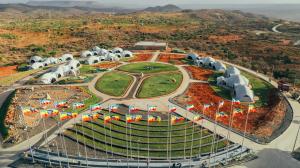
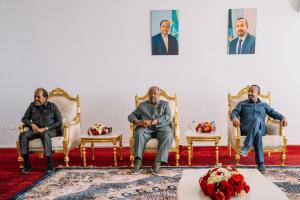
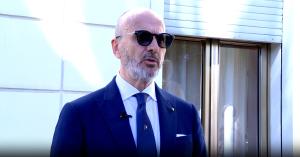
.jpg)
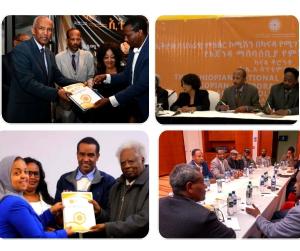



.jpg)



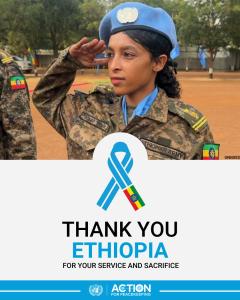
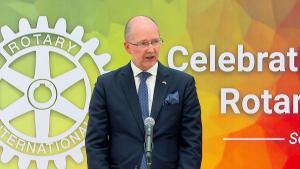
.jpg)
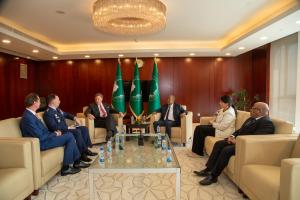
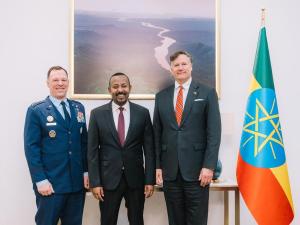
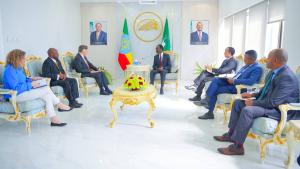
.jpg)
.jpg)
.jpg)
.jpg)
.jpg)
.jpg)

.jpg)
.jpg)
.jpg)
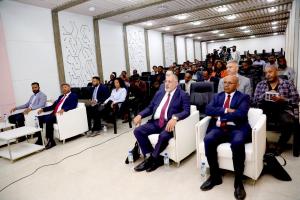




.jpg)
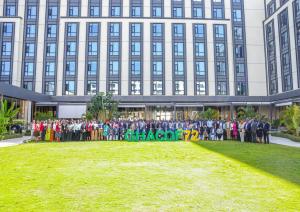
.jpg)

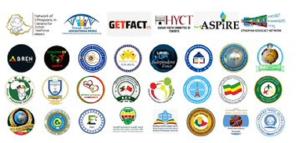

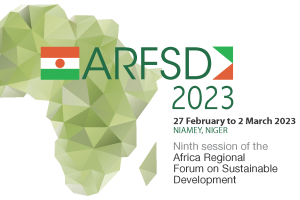
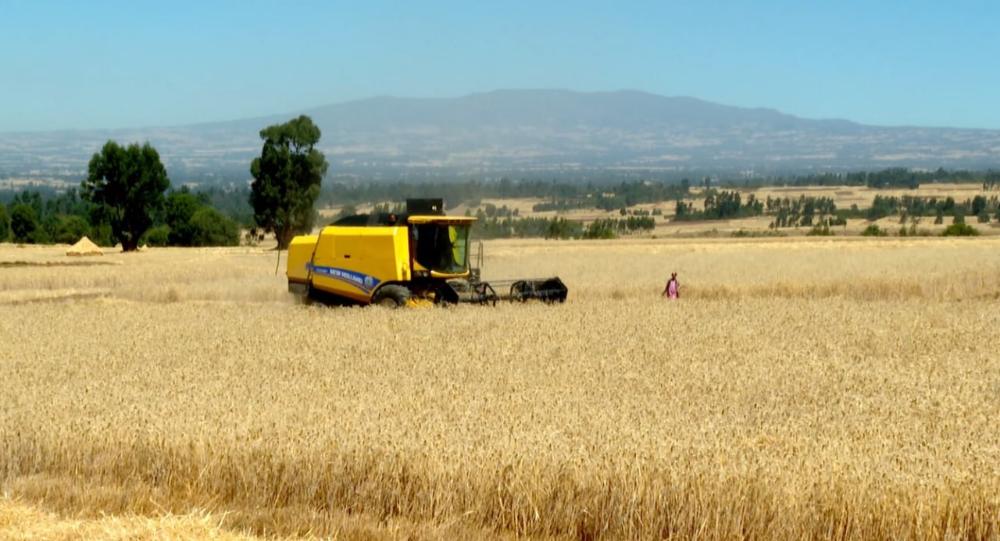
.jpg)